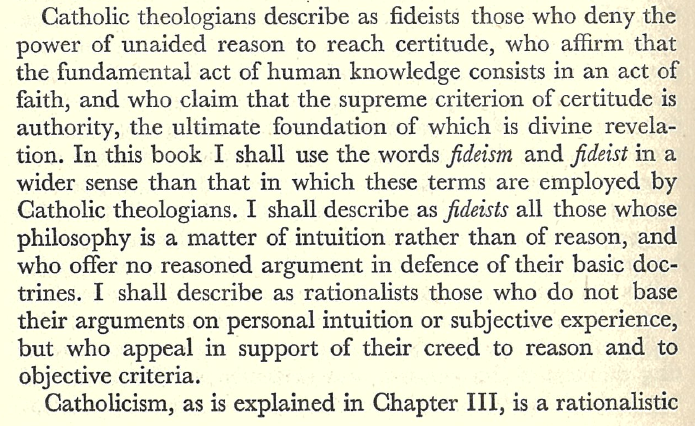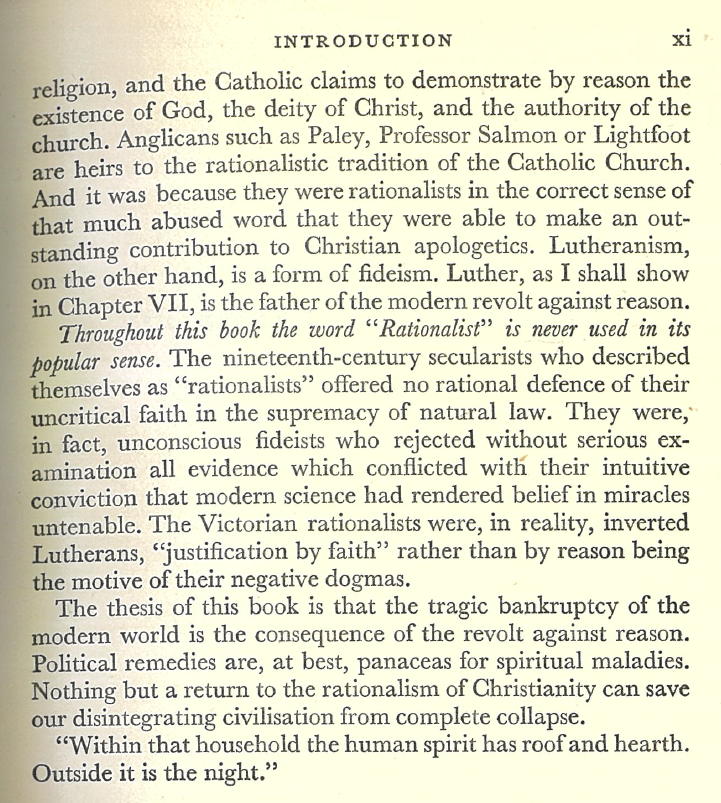
Fideism, reason and… —the gap that is always there
This post follows on from discovering that belief in belief, or believing in believing, or having faith in faith— is a heresy in the biggest Christian Churches, because obedience.
I covered this in :
- To build a better world, we should destroy the Catholic Church
- Fideism & Obedience : the extra bit about St Augustine of Hippo
- Sister Wendy on love as an obedient art
I was at work when first writing those posts, and while cataloguing books into a library system I discovered the following from Arnold Lunn’s The Revolt against Reason:

Arnold Lunn. The Revolt against Reason. Eyre & Spottiswoode, 1951, page x. (American edition available sorta at internetarchive.org)
I’m reading that pronounial “who affirm” as referring to the “fideists” not “catholic theologians”. Though I guess such theologians would agree the act of faith is important — where it is in obedience to the church’s shamanic authority over the divine revelation.
No mention here by Lunn of heresy, as that would mean using the terms Fideism/fideist narrower sense, and he would have to talk about obedience to the Catholic Church as the only virtue (as Sister Wendy puts it). Also by broadening the definition he removes intentionality, or the act of intention, i.e attention with attitude: intuition not usually being regarded as high in active willpower, but often more like piece of mental luck.
So then, to repeat, acts of loyalty to a feudal structure and obedience as a virtue, are of less interest to Lunn than throwing reason itself into the gap.
Fideism here is not a choice among many then, as is what heresies are, choices which lead away from obedience, but simply a direct refusal of reason. Intuition as an act of self rather than will. I guess it could be seen as a criticism of fascism as an indulgence that all about feelings and turning them into glorious deeds by picking on people weaker than oneself.
Interestingly, in Lunn’s framework reason/faith structurally define each other. Lunn accepts the framework that they should do so, even if it is only since they were sent off so-entangled across the universe by St Augustine of Hippo, or a little earlier.
Within this discourse however, the direct refusal of reason in Fideist stances disobeys Lunn’s reasonable structure (as inherited), rather than the church itself.
You should obey because it makes the world (safe). Reason leads to good outcomes. Must be some Kant in here someplace.
Dropping one side of the reason/faith dance is therefore unhinged. Lunn describes dropping the faith-defined reason as follows:

Arnold Lunn. The Revolt against Reason. Eyre & Spottiswoode, 1951, page xi.
A Pyrrhonist might agree with some of this, but not in order to throw something else into the gap. A Pyrrhonist is likely to remain suspended above it all.
For the Catholic and Orthodox churches the reasoning, in the reason/faith dance, is something the church does, the faith bit is for the members of the faith where it is an act of loyalty which shows obedience to the churches reason/ing.
For Lunn, the dropping either of faith or reason means you have nothing good to throw into the gap, because of the original structural definition faith/reason are only good in relation to each other. Fideists deconstruct that “good thing”, the horror they split the binarising and discard one half of the whole, and say things like:
“I believe because it is absurd.”
“Insane,” replies Lunn.
It’s “structural” because it structures the framework Lunn uses to worldbuild/live/dream by. Attacking the world you live in is what insanity does.
To attack someone’s framework, is to attack their world, to attack their world is to attack them!
The sky is falling. Danger, danger.
But the gap is always there. And while many of us feel it must be filled — for otherwise the centre cannot hold, and the universe would collapse.
But life goes on. So it goes.
The gap, this gap? The… —gap. The gap… — or bust.
Of course a Fideist throws belief-in-belief or faith-in-faith into the gap. This appears more “coherent” to me than Lunn’s entangled pair (faith-reason), or is it reason-faith? Do they differ? Tell me in the comments.
Which one is St Augustine of Hippo using to create the City of God?
And remember, mind the gap.
